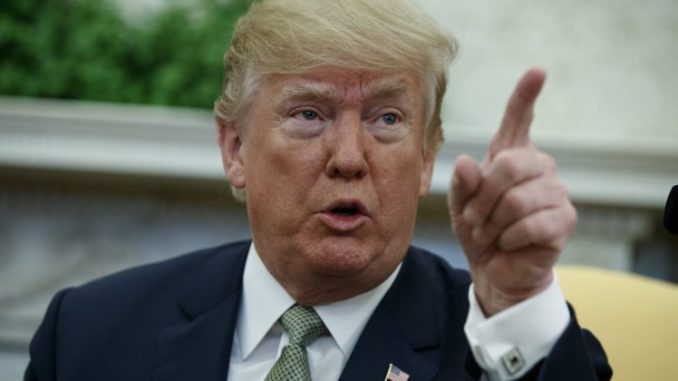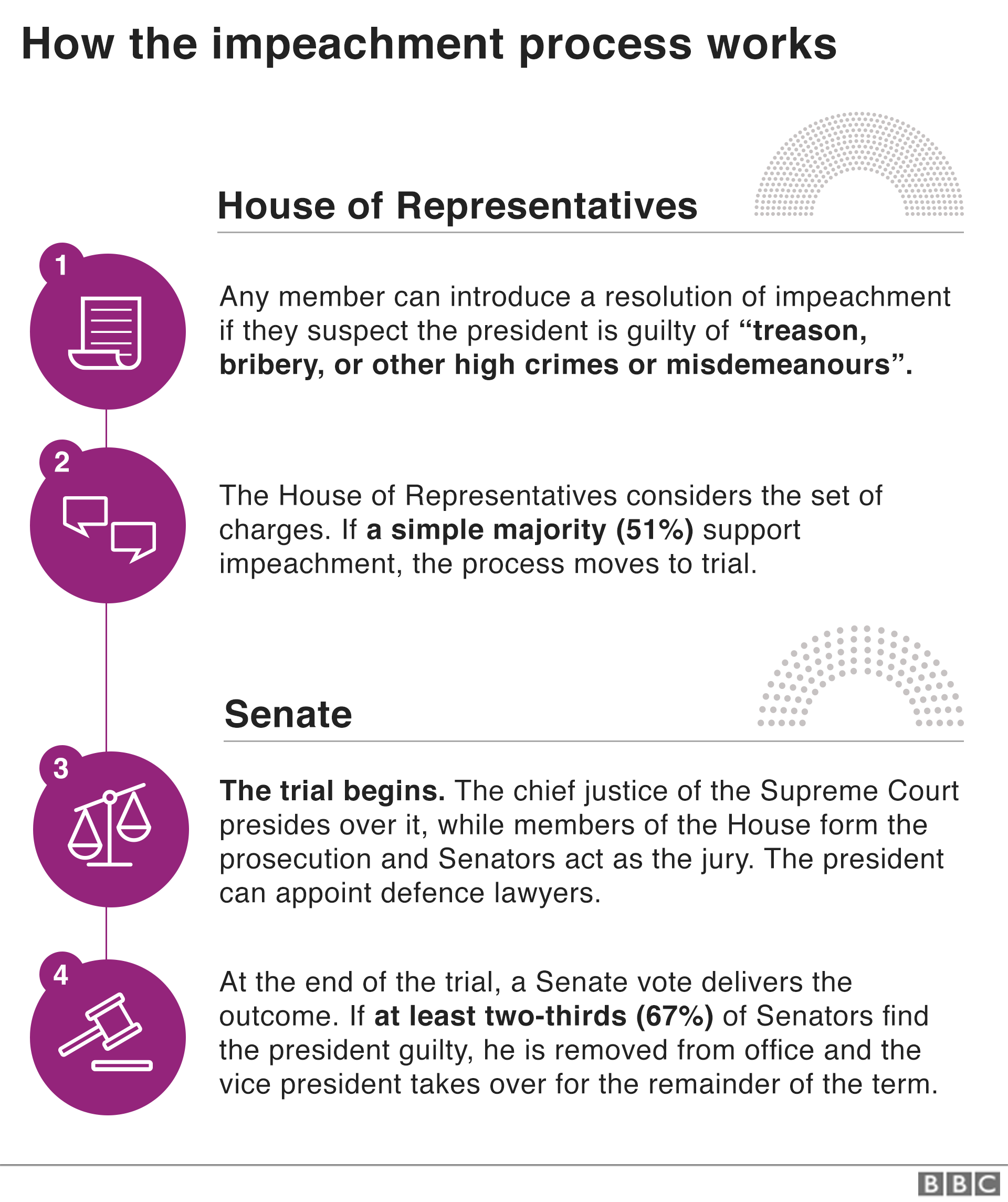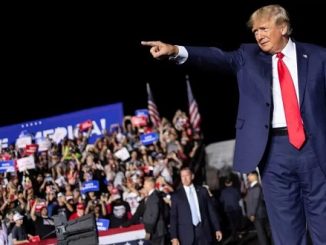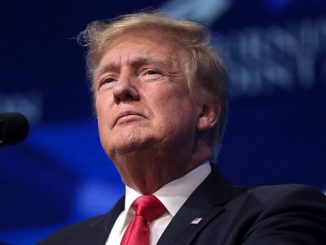
Members of US Congress have seen for the first time a whistleblower complaint against Donald Trump that has led to calls for his impeachment.
One Democrat described it as “disturbing” while a Republican said it was “troubling”.
The complaint refers to a controversial phone call between Mr Trump and the Ukrainian president, US media say.
The latest developments come as the acting director of US intelligence is due to testify on the issue.
Joseph Maguire’s account of the complaint by an unnamed intelligence officer will be closely scrutinised when he appears before members of the House Intelligence Committee later on Thursday.
The content of the complaint is still classified but the most senior Democrat in the US Senate, Chuck Schumer, has called for its immediate release.
During a news conference on Wednesday evening, President Trump again dismissed the impeachment proceedings as a “hoax” and a “witch-hunt”.
According to notes of the 25 July phone call, President Trump asked his Ukrainian counterpart, Volodymyr Zelensky, to look into corruption claims involving the son of Joe Biden, Mr Trump’s possible rival in next year’s presidential election. There is no evidence of any wrongdoing by the Bidens.
In a tweet on Wednesday, Mr Biden accused President Trump of “an abuse of power“.
What’s the latest?
The complaint against the president was hand-delivered to members of Congress on Wednesday.
It is said to concern not only Mr Trump’s call with President Zelensky but also the way that records of the conversation were handled by White House staff, the New York Times reported.
“I found the allegations deeply disturbing. I also found them very credible,” said Adam Schiff, Democratic chairman of the House Intelligence Committee.
“I think that what this courageous individual has done has exposed serious wrongdoing,” he said referring to the whistleblower. “We will do everything possible to protect you.”
Lawmakers have said they hoped to hear from the whistleblower at some point, but no meeting has been scheduled.
Democrat committee member Mike Quigley called the complaint “deeply disturbing” while Senator Ben Sasse, a Republican member of the Senate Intelligence Committee, said there were “real troubling things here”.
“Republicans ought not just circle the wagons [to protect Mr Trump],” he said.
However Mike Conaway, a Republican member of the House Intelligence Committee, said he did not think the complaint would compromise Mr Trump, adding: “I haven’t seen anything that bothers me.”
Mr Schumer, calling for the contents of the complaint to be made public, said: “The public has a right to read the whistleblower’s complaint for themselves.”
What about the impeachment inquiry?
Democrats accuse Mr Trump of seeking foreign help in the hope of smearing Joe Biden and of using aid as a potential bargaining tool.
Under the US constitution, a president can be impeached for “treason, bribery, or other high crimes and misdemeanours” – a procedure that can lead to removal from office.
In July, Mr Trump froze military aid to Ukraine, but he has insisted that this was not used to put pressure on the new government in Kiev.
A House vote to impeach the president could trigger a trial in the Senate on whether to remove Mr Trump from office.
Congress’s investigation focuses partly on whether Mr Trump abused his presidential powers and sought to help his own re-election by seeking the aid of a foreign government to undermine Mr Biden.

Democratic leader of the House of Representatives, Speaker Nancy Pelosi, said such actions would mark a “betrayal of his oath of office” and declared: “No-one is above the law.”
But on Wednesday Mr Trump said denied he had put pressure on Mr Zelensky.
“I didn’t do it. I didn’t threaten anybody,” he said. “No push, no pressure, no nothing. It’s all a hoax, folks, it’s all a big hoax.”
What did Trump say about Biden in the call?
Mr Trump discusses with newly elected Mr Zelensky the 2016 removal of a prosecutor, Viktor Shokin, according to notes of their telephone conversation released by the White House.
The US president is quoted as saying in the half-hour call: “I heard you had a prosecutor who was very good and he was shut down and that’s really unfair.
“A lot of people are talking about that, the way they shut your very good prosecutor down and you had some very bad people involved.”
He continues: “The other thing, there’s a lot of talk about Biden’s son, that Biden stopped the prosecution [of Mr Biden’s son] and a lot of people want to find out about that so whatever you can do with the [US] Attorney General would be great.
According to ABC News, an adviser to Mr Zelensky has contended that discussing the Biden case was a US precondition to any phone call between the two leaders.
On the call, the US president also asks Mr Zelensky to work with US Attorney General William Barr and Mr Trump’s personal lawyer, Rudolph Giuliani, to look into the matter, according to the notes.
The Department of Justice said on Wednesday that Mr Trump had not spoken with the attorney general about having Ukraine investigate Mr Biden, and Mr Barr had not communicated with Ukraine.
What is the claim against Joe Biden?
Mr Trump and his conservative allies have focused on how Mr Biden, as US vice-president in 2016, lobbied Ukraine to fire Mr Shokin.
Mr Shokin’s office had opened an investigation into Burisma, a natural gas company on which Mr Biden’s son, Hunter Biden, was a board member.
Other Western officials had called for Mr Shokin to be fired because of the perception that he was soft on corruption.
Mr Biden last year told a foreign policy event how he threatened to withhold $1bn in aid to Ukraine unless Mr Shokin was removed.
How the controversy unfolded
- 18 July – President Trump orders White House aide to hold back almost $400m in military aid to Ukraine, report US media
- 25 July – President Trump speaks with Ukraine’s leader in a 30-minute phone call
- 9 September – Congress learns of a whistleblower’s complaint about the call, but is blocked by the Trump administration from viewing it
- 11 September – Military aid for Ukraine is cleared for release by the Pentagon and US Department of State
- 23 September – Trump confirms he withheld Ukrainian aid, saying it was due to concerns about “corruption”
- 24 September – Trump says the aid was withheld so that other countries would pay more
What’s the Trump-Ukraine story about?







Be the first to comment